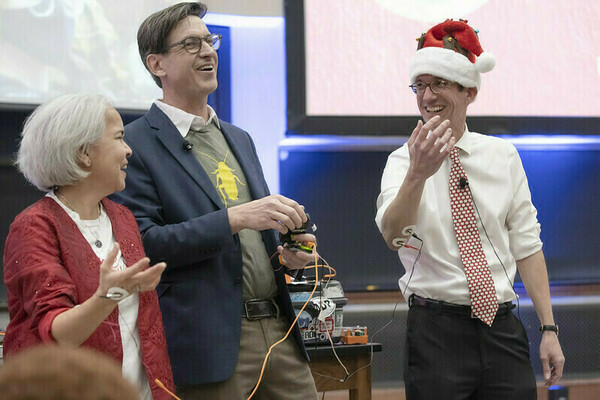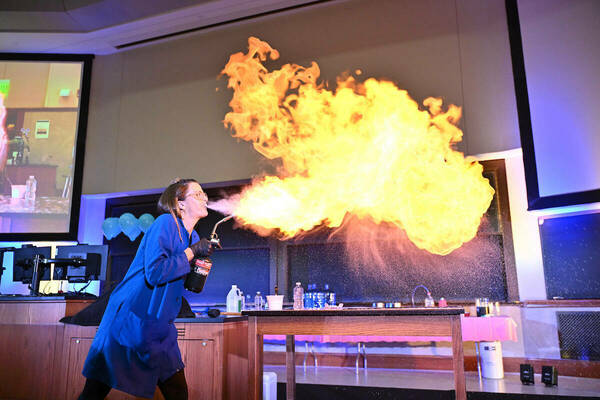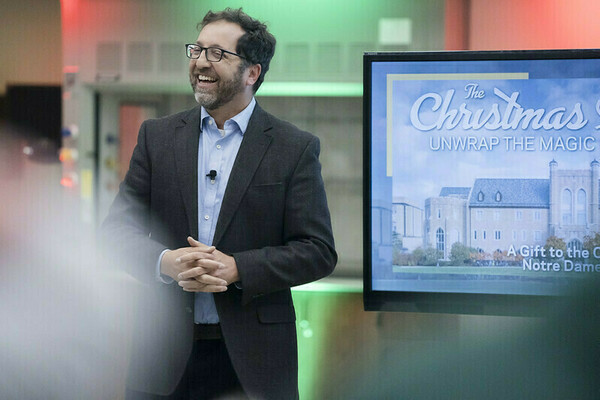Admittedly, cockroaches, calculations, and chemistry don’t scream “Christmas.”

But Santiago Schnell, the William K. Warren Dean of the College of Science, wasn’t looking to start a lecture series about the holiday when he adapted the annual College of Science Christmas Lecture idea from a nearly 200-year-old tradition in the United Kingdom. He was looking to present a gift to the community: A gift not only filled with science, but also with family fun.
Beginning with that first lecture in 2021, when Greg Gage of Backyard Brains used science to tease a twitch from a cockroach’s leg in front of more than 200 people in the Jordan Hall of Science, Schnell’s vision was to teach and entertain. One of Schnell’s initiatives since becoming dean is to promote scientific engagement — those activities that span the gap between science, scientists, and society.
For two centuries, the Royal Institution Christmas Lectures have communicated science to the general public, and Schnell, who earned his doctorate degree at Oxford University, has said the lecturer for the series needs to follow Faraday’s principle of taking nothing for granted as known.
"History shows that public engagement isn't just important, it's essential for the future of science, democracy, and a just society," Schnell said. "By opening our doors to the community, we can demystify scientific discoveries, empower citizens to participate in informed decision-making on issues like poverty and ethics, and work together to tackle critical challenges facing our democracy.
“These collaborations will shape a brighter future where science plays a vital role in building a more just and equitable society."
Any time scientists share their skills and knowledge, “it’s a gift that keeps on giving,” said Kate Biberdorf, also known as Kate the Chemist. She is a science communicator, entertainer and associate professor of chemistry at the University of Texas, Austin. The Christmas Lecture speaker in 2023, she mesmerized audiences with colorful chemistry demonstrations from breathing fire, to exploding paint cans, to flaming balloons.

“After seeing the show, hopefully (a child’s) future will include STEM,” she said. “Every time I travel for one of these events, my goal is to inspire at least one student to fall in love with chemistry — and based on the conversations I had with the families after the shows, I know we created a bunch of future scientists!”
Michelle Thaller, assistant director for science communications at NASA’s Goddard Space Flight Center, will be the 2024 Christmas Lecture speaker. The science communicator, astronomer, and research scientist has been on the History Channel show The Universe, and The Science Channel series How the Universe Works, Strip the Cosmos, and The Planets and Beyond.
Her talk will be on Friday, Dec. 6, and will take place at the Century Center in South Bend. The off-campus location will be even more accessible to people in the community.
The 2023 event brought significant attendance — 350 people attended on Friday, Dec. 1 for the public portion of Biberdorf’s show, while an additional 130 attended on Saturday morning, during a closed event for Scouts. On social media, reels from her show were played more than 10 million times, with more than 680,000 likes and 55,000 shares.
The Christmas Lecture events have already built a following. John Slott, of South Bend, has brought his children Miriam, 14, Teddy, 12, and Zoe, 10, to all three Christmas Lectures so far. Even though they’re often on campus for sporting events, movies, walks around the lakes, and many other events — Slott is a senior web content strategist for Notre Dame — he said the Christmas Lecture is one of their favorites.

“Zoe especially looks forward to meeting the speakers and maybe even getting a book signed. They find the demonstrations really captivating,” he said.
His children laughed when, during the first lecture, Gage zapped the cockroach legs to make them twitch. The next year, they enjoyed crowdsourcing poetry using mathematical principles with Jordan Ellenberg. And this past year, Slott’s children were amazed as they watched a scientist spit fire and create explosive reactions, he said.
“These are the things the kids remember, talk about, and recount each year when the new lecture is announced,” Slott said. “We've invited cousins, friends, and this year, grandparents to join us.”
What Jordan Ellenberg, the author of "How Not to Be Wrong: The Power of Mathematical Thinking,” liked best about the Christmas Lecture he gave in 2022 was that it felt like a true community event, and not only a campus event, he said.
“I loved how many parents and kids were in the audience,” he said. “I see events like this as a continuation of my teaching, and I am a big believer that university teaching shouldn’t be limited to people between 18 and 22.”